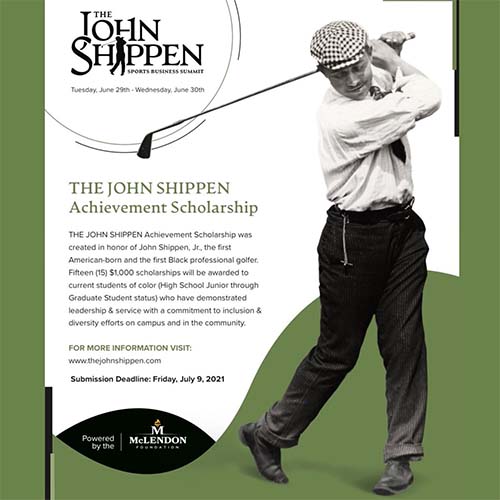
June 24, 2021
THE JOHN SHIPPEN Achievement Scholarship will award Fifteen (15) $1,000 scholarships to current students of color (High School Junior through Graduate Student status) who have demonstrated leadership & service with a commitment to inclusion & diversity efforts on campus and in the community.
THE JOHN SHIPPEN Achievement Scholarship was created in honor of John Shippen, Jr., the first American-born and the first Black professional golfer. To be eligible to apply, students must identify as one of the following:
- American Indian, Native American or Alaskan Native
- Asian or Pacific Islander
- Black, Afro-Caribbean or African-American
- Hispanic or Latina(o)(x)
- Middle Eastern, Arab American or Chaldean American
- South Asian or Indian American
Candidates must also have a minimum high school or undergraduate grade point average of 2.7 (based on a 4.0 scale) or its equivalent, submit a Letter of Recommendation, attend the 2021 John Shippen Sports Business Summit will receive five (5) additional points to the their final application score and submit a 250-word essay or submit a 60-90 second creative video showcasing their personal story.
For full eligibility requirements and details on The John Shippen Scholarship and Internships visit https://www.minorityleaders.org/the-john-shippen/
John Shippen was the First Black Golf Professional AND the First American-Born Golf Professional John Matthew Shippen, Jr. (1879-1968) was born on December 5, 1879. His father, born into slavery in Virginia, became a free man following the Civil War. He then moved to Washington, D.C. where he attended Howard University and received a degree in theology. When John Jr. was age nine, his family moved to the Shinnecock Indian Reservation in Southampton on Long Island, NY, where his father was assigned as pastor.
As a teenager, Shippen worked with crews to help clear the land and build the original Shinnecock Hills golf course, which was near the reservation. Willie Dunn, a Scottish golf professional who designed the final holes at Shinnecock Hills, taught some of the young workers how to caddy and play the game, including John Shippen and his friend, Oscar Bunn, a Shinnecock Indian. Shippen had a natural talent for the game and became one of Dunn’s best students. By the age of 16, Shippen was working full-time as Dunn’s assistant, giving lessons to members, working as a caddy, repairing clubs, scorekeeping and assisting the maintenance crew.

